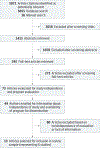Independent Evaluation of Middle School-Based Drug Prevention Curricula: A Systematic Review
- PMID: 26367105
- PMCID: PMC6528821
- DOI: 10.1001/jamapediatrics.2015.1736
Independent Evaluation of Middle School-Based Drug Prevention Curricula: A Systematic Review
Abstract
Importance: Lack of robust program evaluation has hindered the effectiveness of school-based drug abuse prevention curricula overall. Independently evaluated randomized controlled trials (RCTs) of universal, middle school-based drug abuse prevention curricula are the most useful indicators of whether such programs are effective or ineffective.
Objective: To conduct a systematic review identifying independently evaluated RCTs of universal, middle school-based drug abuse prevention curricula; extract data on study quality and substance use outcomes; and assess evidence of program effectiveness.
Evidence review: PsycInfo, Educational Resources Information Center, Science Citation Index, Social Science Citation Index, Cumulative Index to Nursing and Allied Health Literature, MEDLINE, EMBASE, and the Cochrane Database of Systematic Reviews were searched between January 1, 1984, and March 15, 2015. Search terms included variations of drug, alcohol, tobacco, and marijuana use, as well as school, prevention, and effectiveness. Studies included in the review were RCTs carried out by independent evaluators of universal school-based drug prevention curricula available for dissemination in the United States that reported alcohol, tobacco, marijuana, or other drug use outcomes. Two researchers extracted data on study quality and outcomes independently using a data extraction form and met to resolve disagreements.
Findings: A total of 5071 publications were reviewed, with 13 articles meeting final inclusion criteria. Of the 13 articles, 6 RCTs of 4 distinct school-based curricula were identified for inclusion. Outcomes were reported for 42 single-drug measures in the independent RCTs, with just 3 presenting statistically significant (P < .05) differences between the intervention group and the control group. One program revealed statistically significant positive effects at final follow-up (Lions-Quest Skills for Adolescence).
Conclusions and relevance: The results of our review demonstrate the dearth of independent research that appropriately evaluates the effectiveness of universal, middle school-based drug prevention curricula. Independent evaluations show little evidence of effectiveness for widely used programs. New methods may be necessary to approach school-based adolescent drug prevention.
Conflict of interest statement
Similar articles
-
School-based programmes for preventing smoking.Cochrane Database Syst Rev. 2013 Apr 30;2013(4):CD001293. doi: 10.1002/14651858.CD001293.pub3. Cochrane Database Syst Rev. 2013. PMID: 23633306 Free PMC article.
-
School-based education programmes for the prevention of unintentional injuries in children and young people.Cochrane Database Syst Rev. 2016 Dec 27;12(12):CD010246. doi: 10.1002/14651858.CD010246.pub2. Cochrane Database Syst Rev. 2016. PMID: 28026877 Free PMC article.
-
Strategies for enhancing the implementation of school-based policies or practices targeting risk factors for chronic disease.Cochrane Database Syst Rev. 2017 Nov 29;11(11):CD011677. doi: 10.1002/14651858.CD011677.pub2. Cochrane Database Syst Rev. 2017. Update in: Cochrane Database Syst Rev. 2022 Aug 29;8:CD011677. doi: 10.1002/14651858.CD011677.pub3. PMID: 29185627 Free PMC article. Updated.
-
Education support services for improving school engagement and academic performance of children and adolescents with a chronic health condition.Cochrane Database Syst Rev. 2023 Feb 8;2(2):CD011538. doi: 10.1002/14651858.CD011538.pub2. Cochrane Database Syst Rev. 2023. PMID: 36752365 Free PMC article.
-
Incentives for preventing smoking in children and adolescents.Cochrane Database Syst Rev. 2017 Jun 6;6(6):CD008645. doi: 10.1002/14651858.CD008645.pub3. Cochrane Database Syst Rev. 2017. PMID: 28585288 Free PMC article.
Cited by
-
Prevalence, perceptions, and consequences of substance use in medical students.Med Educ Online. 2017;22(1):1392824. doi: 10.1080/10872981.2017.1392824. Med Educ Online. 2017. PMID: 29072119 Free PMC article.
-
Methodological Advances in Leveraging Neuroimaging Datasets in Adolescent Substance Use Research.Curr Addict Rep. 2019 Dec;6(4):495-503. doi: 10.1007/s40429-019-00275-x. Epub 2019 Sep 9. Curr Addict Rep. 2019. PMID: 32714741 Free PMC article.
-
Steps Towards Alcohol Misuse Prevention Programme (STAMPP): a school-based and community-based cluster randomised controlled trial.BMJ Open. 2018 Mar 9;8(3):e019722. doi: 10.1136/bmjopen-2017-019722. BMJ Open. 2018. PMID: 29525770 Free PMC article. Clinical Trial.
-
Social Interface Model: Theorizing Ecological Post-Delivery Processes for Intervention Effects.Prev Sci. 2018 Nov;19(8):987-996. doi: 10.1007/s11121-017-0857-2. Prev Sci. 2018. PMID: 29297131
-
Impact of cannabis legalization on treatment and research priorities for cannabis use disorder.Int Rev Psychiatry. 2018 Jun;30(3):216-225. doi: 10.1080/09540261.2018.1465398. Epub 2018 Jun 29. Int Rev Psychiatry. 2018. PMID: 29956576 Free PMC article. Review.
References
-
- US Department of Health and Human Services. NREPP: SAMHSA’s National Registry of Evidence-Based Programs and Practices. http://www.nrepp.samhsa.gov/.Published 2014. Accessed March 17, 2014.
-
- Gorman DM, Conde E, Huber JC Jr. The creation of evidence in “evidence-based” drug prevention: a critique of the Strengthening Families Program Plus Life Skills Training evaluation. Drug Alcohol Rev. 2007;26(6):585–593. - PubMed
-
- Flay BR, Biglan A, Boruch RF, et al. Standards of evidence: criteria for efficacy, effectiveness and dissemination. Prev Sci. 2005;6(3):151–175. - PubMed
-
- Sánchez V, Steckler A, Nitirat P, Hallfors D, Cho H, Brodish P. Fidelity of implementation in a treatment effectiveness trial of Reconnecting Youth. Health Educ Res. 2007;22(1):95–107. - PubMed
Publication types
MeSH terms
Grants and funding
LinkOut - more resources
Full Text Sources
Other Literature Sources
Medical
Miscellaneous


